|
|
|
Sort Order |
|
|
|
Items / Page
|
|
|
|
|
|
|
| Srl | Item |
| 1 |
ID:
142608
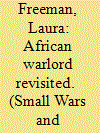

|
|
|
|
|
| Summary/Abstract |
To date, warlordism in Africa has been viewed solely negatively. This has come about, in part, because of the analytical lenses that have been used. Typically, warlordism has been examined at the state level; and behavioural traits, rather than definitionally necessary components, have been the focus. In effect, ‘warlord’ has been confused with other violent actors. I suggest here a reconceptualisation ‘from below’, which takes into account variation in types of warlordism, and which allows for both positive and negative effects of warlordism on society and the state.
|
|
|
|
|
|
|
|
|
|
|
|
|
|
|
|
| 2 |
ID:
023767


|
|
|
|
|
| Publication |
New York, St. John's University, 1981.
|
| Description |
lxi, 978p.Hbk
|
| Contents |
Abridge edition by Chun-Ming Chang
|
| Standard Number |
087075259
|
|
|
|
|
|
|
|
|
|
|
|
Copies: C:1/I:0,R:0,Q:0
Circulation
| Accession# | Call# | Current Location | Status | Policy | Location |
| 026896 | 923.151249/FUR 026896 | Main | On Shelf | General | |
|
|
|
|
| 3 |
ID:
088225
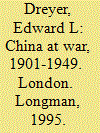

|
|
|
|
|
| Publication |
London, Longman, 1995.
|
| Description |
ix, 422p.hbk
|
| Standard Number |
0582051258
|
|
|
|
|
|
|
|
|
|
|
|
Copies: C:1/I:0,R:0,Q:0
Circulation
| Accession# | Call# | Current Location | Status | Policy | Location |
| 037092 | 951.05/DRE 037092 | Main | On Shelf | General | |
|
|
|
|
| 4 |
ID:
133260
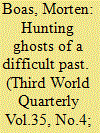

|
|
|
|
|
| Publication |
2014.
|
| Summary/Abstract |
This article explores the relationship between the International Crisis Group's (icg) interpretation of the civil wars in Liberia and Sierra Leone and the main academic 'greed and grievance' debate at the time. It shows that the icg's early policy recommendations were basically in line with the interpretation of these wars as caused by 'opportunistic warlordism'. However, this supposed causal link is less evident in the analytical parts of its early reports, and in the policy recommendations of later reports. These contradictory findings point to both internal developments within the icg and to its 'two faces': it seeks to influence policy makers using detailed empirical analysis on the ground in countries in conflict or transition, but is also aware that policy makers do not generally read long reports, thus it produces executive summary and policy recommendations for this target audience. The article argues that policy recommendations cannot work without the analytical parts of the reports: the analysis sections' main function is to add legitimacy to policy recommendations and the organisation overall, contributing to its image as a genuine 'on-the-ground producer' of crisis knowledge and fostering its expert authority.
|
|
|
|
|
|
|
|
|
|
|
|
|
|
|
|
| 5 |
ID:
027115
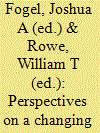

|
|
|
|
|
| Publication |
Boulder, Westview Press, 1979.
|
| Description |
xiv, 325p.hbk
|
| Standard Number |
0891580913
|
|
|
|
|
|
|
|
|
|
|
|
Copies: C:1/I:0,R:0,Q:0
Circulation
| Accession# | Call# | Current Location | Status | Policy | Location |
| 019279 | 951.033/FOG 019279 | Main | On Shelf | General | |
|
|
|
|
| 6 |
ID:
004794
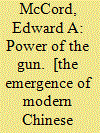

|
|
|
|
|
| Publication |
Berkeley, University of Calfornia Press, 1993.
|
| Description |
vii, 436p.hbk
|
| Standard Number |
0520081285
|
|
|
|
|
|
|
|
|
|
|
|
Copies: C:1/I:0,R:0,Q:0
Circulation
| Accession# | Call# | Current Location | Status | Policy | Location |
| 035785 | 951.041/MCC 035785 | Main | On Shelf | General | |
|
|
|
|
| 7 |
ID:
103123
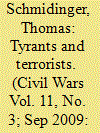

|
|
|
|
|
| Publication |
2009.
|
| Summary/Abstract |
Failed states that foster warlords and terrorists are now an increasing challenge to state stability across the Middle East. This paper uses the case studies of Iraq and Sudan to show how a neo-liberal policy of dismantling the public sector by an illegitimate regime that combines tribalisation with the arbitrary use of power leads to dramatic weakening of the state and an increase in warlordism.
|
|
|
|
|
|
|
|
|
|
|
|
|
|
|
|
| 8 |
ID:
076182
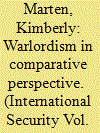

|
|
|
|
|
| Publication |
2006.
|
| Summary/Abstract |
Warlordism creates significant problems in failed states: it impedes the development of stable and secure societies, thwarts economic growth, and creates new threats to international security. Through a comparative study of four seemingly disparate cases-medieval Europe, Republican China, and Somalia and Afghanistan in the mid-2000s-it is possible to develop an inductive, generalizable definition of warlordism. Warlordism emerges when armed men seize small slices of territory in disintegrating states for their own benefit, using charisma and patronage ties to cement their local authority, and disrupting commerce and investment through their fragmentary rule. Two causal factors were necessary for the demise of warlordism in medieval Europe and Republican China: the presence of a powerful and aggrieved economic interest group, and the appearance of a transformative idea from outside the existing system that supported the interest group's actions. If this same causal relationship holds true today, then warlordism will be more quickly eliminated in Somalia than in Afghanistan. The international community can take action to help eliminate warlordism, but change ultimately depends on domestic factors and will likely be violent.
|
|
|
|
|
|
|
|
|
|
|
|
|
|
|
|
|
|
|
|
|